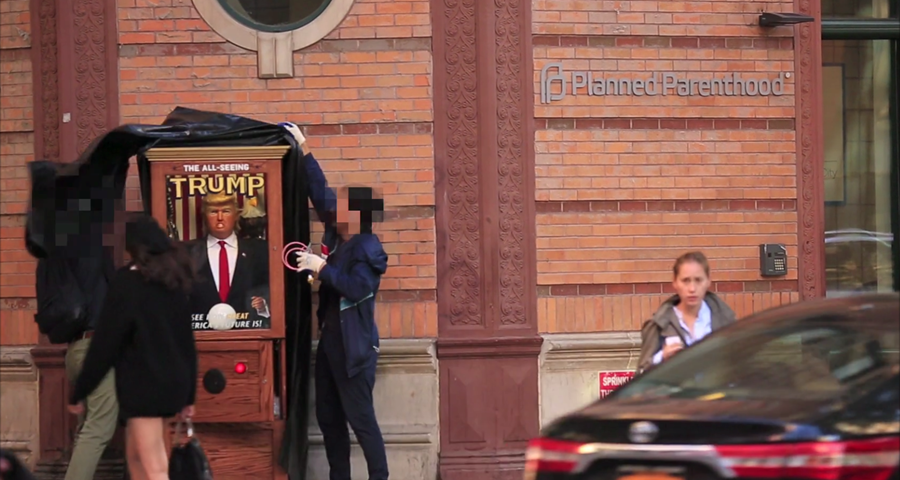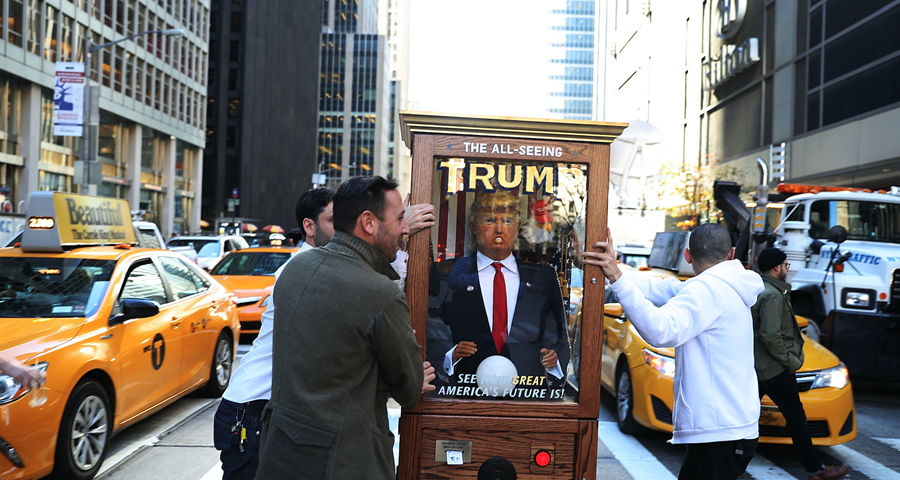The All-Seeing Trump Hope to Nope: Graphics and Politics 2008 - 2018
Q&A with Nathaniel Lawlor, Andy Dao, Jon Barco and Bryan Denman
In this latest Q&A to mark the Hope to Nope exhibition, the Design Museum speaks to the design team behind the animatronic fortune-telling Trump machine, on display inside the gallery. Read on if you dare!
Q:
Where did the idea to combine Donald Trump and Zoltar come from?
During early 2016, as Trump was becoming the Republican nominee, it became clear to us that we had to use our skill set as writers, artists, and designers –– to speak out against Trump. We had previously done some activist projects on topics like racial profiling and income inequality (see Occupy George, also featured in Hope to Nope) and are strong believers that interactive creative projects are a great way to engage people in conversations they might otherwise not participate in. With the over-saturation and bombardment of Trump in the news cycle, we saw how easy it was becoming for people to tune out the banter of these soundbites and Facebook headlines, so we thought—what better way to remind people of their gravitas than by showing them this could be their actual future?

Q:
Take us through your thought process and design thinking when you approached this project.
Once we had the kernel of the idea, the vision materialized very quickly. In fact, the final piece you see today is very close to the initial sketches we made. It was very important to us that the piece felt authentic—true to the real Zoltar machines found in the movie Big, and in places like Coney Island.
And while coming up with the idea was easy, the actual making of it proved to be much more laborious than we anticipated. The production portion of this project was certainly beyond our area of expertise. So we assembled a talented team of friends and experts to help us bring our vision to life over a span of 4-5 months. There were the custom cabinet-makers, the mechanics, the letter painter, the sculptor, the wig maker, make-up artists, the hat/flag maker, and so many others we're forgetting. We were very pedantic about every last detail that went into creating that ominous feeling you get when you’re staring into the demonic glowing eyes of the leader of the “Free World.”


Q:
How did you manage to assemble and transport The All-Seeing Trump around New York, whilst keeping your identities anonymous?
Like every other aspect of the project, it was a very grassroots, hand-on process. We rented a moving van for about two-weeks and used it to transport the machine. The van would drop us off at an approximate location and a driver would stay in the van in case we needed to quickly leave an area. To keep a low profile, the machine was cloaked by a nondescript black cover, making it look like we were carting around a refrigerator. Once we would arrive at our destination, we’d turn on the machine, unzip the cover and simply walk away while an audience would quickly form. I’ve probably said too much.


Q:
The voice of Donald Trump is very accurate. Who does the voice?
The one and only Anthony Atamanuik. I believe he knows Trump better than Trump knows himself.
Q:
How many pre-recorded answers are housed inside the All-Seeing Trump? Were there any challenges with writing them and did you ever feel that you were going too far?
I don’t remember the exact number, but I believe the machine has approximately 30 messages. To get into character we spent hours listening to Trump’s many incoherent speeches. Getting into the mind of someone who doesn’t have one was torture, but a necessary evil to help us develop the voice behind the machine. We wanted the messages to relate back to the things Trump had said on the campaign trail and then humorously extrapolate from them. The biggest challenge was keeping up with the daily deluge of outrageous moments of Trump being Trump. We’d write something that would make us wonder if it was too much of a stretch, but then the next day he’d say something even more outlandish. And when the “Grab her by the p*y” happened, we realised there was no going too far, because he would always go further.

Q:
Given the politically charged nature of your work, have you experienced any obstacles whilst working on or presenting your installation piece?
For the most part, no. People respectfully understand what this project represents. It’s purely a reflection of how abhorrent the real version is.
Q:
How have people reacted to your work?
The reactions have been incredible. People really engage with and interact with the piece. We intentionally kept the messages about 45-seconds long because we figured people would just listen to one message and be on their way, but we’ve observed quite the opposite. It draws quite the crowd. The All-Seeing Trump even made an appearance at a Trump rally where we thought we’d receive some resistance, but nothing ever got out of hand (though we did hire two bodyguards and dress them like secret service, just in case).

Q:
Will the All-Seeing Trump make an appearance on US Election Day on 6 November 2018?
So far no plans.
Q:
What’s the one thing you’d like people to remember about your exhibit when they leave the Hope to Nope exhibition?
We want our work to serve as a reminder that the events taking place around us are not normal. These are weird and scary times and it’s important to not lose sight of that. We hope this piece inspires you to advocate for causes that are important to you. Please do something, whether that’s creating art, volunteering, or donating. Be an ally to those who are being marginalized.
Q:
The Hope to Nope exhibition is a retrospective of the last ten years in politics and graphic design. Which event do you remember the most from the past decade, which has left the most impact on you?
We’ve done various projects, mostly involving social-equality, but the Occupy movement that took place in the US during the fall of 2011 was a transformative experience. For some of us it was an introduction to civil disobedience. It encouraged us to dig deeper and learn more about the darkside of American history. It opened our eyes to injustices we can’t unsee.
Q:
Finally, if you had one piece of advice for a young designer who had a narrative to tell, what would it be?
Study your heroes. Develop your own voice. And have a point of view.
Find out more